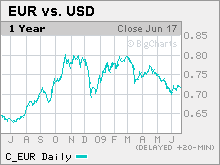Dollar and yen slide
Renewed economic hopes boosts demand for more risky assets, such as stocks and commodities, and weighs on the greenback.
NEW YORK (Reuters) -- The dollar and yen fell Friday, while higher-yielding currencies such as the Australian dollar rose as more upbeat U.S. data and gains in equities boosted hopes that a global economic recovery was on track.
That made investors comfortable buying riskier assets such as stocks and commodities and the currencies tied to them as they pared back holdings of the safe-haven U.S. dollar.
Declines in the dollar against the euro were limited, however, as investors were wary ahead of a Federal Reserve policy meeting and issuance of another record batch of U.S. government debt.
"There's a little bit of risk appetite in the market and there's still optimism out there," said Vassili Serebriakov, senior currency strategist at Wells Fargo in New York.
"So we're seeing a sell-off in the dollar against the commodity currencies in particular. The correlation between a lower dollar and higher equities hasn't gone away although it hasn't been as strong."
The positive outlook stemmed from Thursday's data showing the number of people on U.S. jobless benefits fell for the first time since January, and manufacturing in the U.S. Mid-Atlantic region shrank much less than expected in June.
In early New York trading, the euro was up 0.3% against the yen to 134.81 yen and by 0.2% against the dollar at $1.3931.
The euro has lost momentum, though, against the dollar above $1.40. Analysts said the euro is still beset with Europe's financial and fiscal situation given disclosure from the European Central Bank this week that European banks may face another $283 billion in losses by the end of next year.
The dollar rose 0.2% against the yen to 96.76 yen .
The Australian dollar outperformed other majors, gaining 1% to 78.05 yen and 0.9% against its U.S. counterpart to $0.8065.
Adding to recent optimism, International Monetary Fund First Deputy Managing Director John Lipsky on Friday pointed to signs the decline in global output has moderated and said the IMF is likely to revise up its 2010 economic growth forecasts.
This helped push European shares higher and oil prices back above $72 per barrel, bolstering commodity currencies such as the Canadian dollar, which pushed the greenback down 0.3% at 1.1291 Canadian.
"The market is gathering greater confidence in the world economy," Bank of New York Mellon currency strategist Neil Mellor said.
The declines in the yen and the dollar were limited, however, with investors unconvinced the recent rally in riskier assets was justified as the global economy is still struggling to emerge from its worst recession in decades.
Another record round of U.S. Treasury auctions -- some $104 billion of debt will be offered next week -- will be closely followed for signs of how investor demand is holding up in the face of an avalanche of new government paper.
Markets will watch whether the Fed addresses a recent rise in short- and long-term interest rates, either by emphasizing it will keep benchmark rates low for some time, or by saying it will extend its purchase of U.S. Treasurys. An aggressive expansion of its buying is seen as unlikely.
The Fed begins its two-day monetary policy meeting on Tuesday, with a decision and statement expected Wednesday. ![]()


